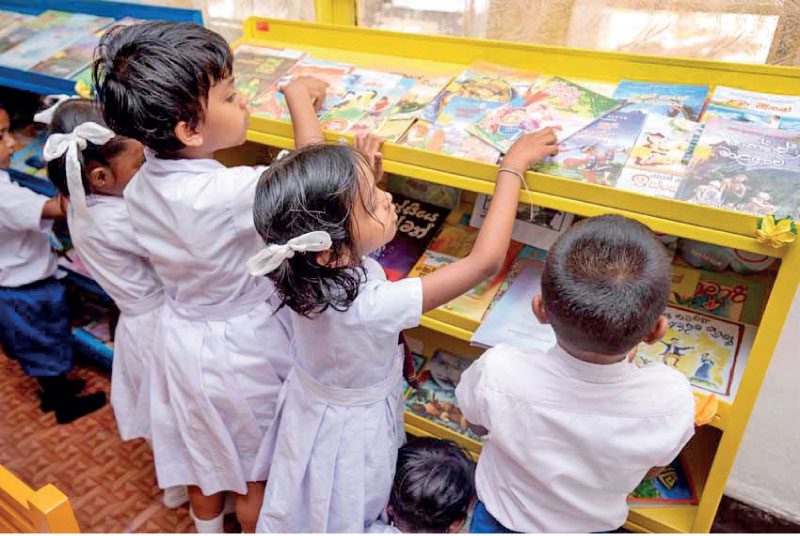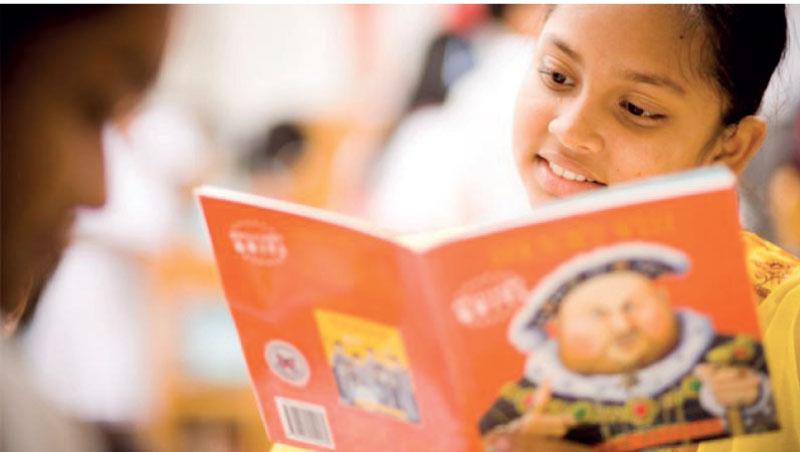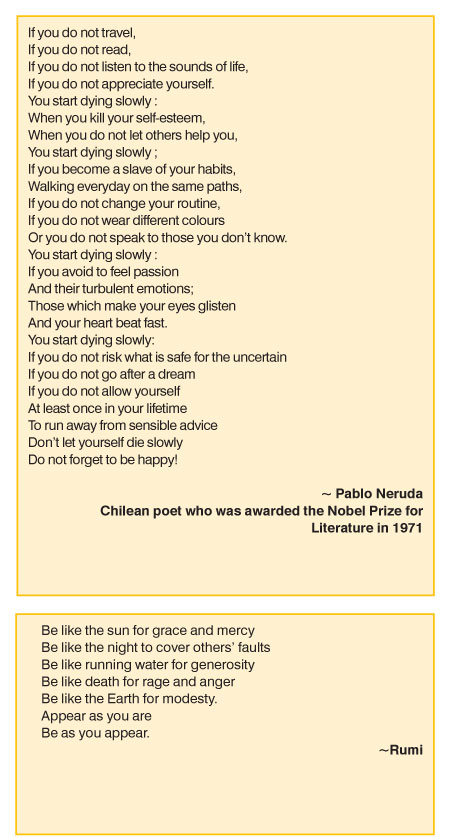Sunday Feb 15, 2026
Sunday Feb 15, 2026
Saturday, 27 January 2024 01:51 - - {{hitsCtrl.values.hits}}


By Surya Vishwa
Knowledge. What is it? How do you measure it? Can it be valued? Can it be trapped into a piece of paper and sold within a segmented timeline like a commodity?
Is knowledge a mere commercial bargain that you purchase and then spend a lifetime paying off the loan for that purchase price (slowly dying in the process) of fatigue and stress related malfunctions.
Is knowledge a string of words to be coiled around the brain, tightening it like a noose until one knows not the meaning of the theoretic that you are churning in the many theses pursued more for social recognition than genuine passion?
And what is education? Is it different to knowledge? What is it to go to school and why should anyone do it? Is it worthwhile? How does one benefit from it? Apart from being able to face a job interview and get employed on account of having ‘been to school’ what does it do for one’s core being, that which makes one want to live, create and smile? Does it do anything at all for this sphere of human consciousness? Buddhism for examples is rooted in the concept of knowledge; the knowledge of the self, the root of all knowledge. When that root is rotten we know not why we do what we do. We resort to being robots pursuing an unconscious artificial intelligence.
It is said that without love we are nothing. The foundation of sanity, kindness, abundance, benevolence, forgiveness and prosperity is love and central to every philosophical or spiritual revelation that has surfaced upon planet earth in its 4 billion odd years of existence. An education system that does not focus on making students love the knowledge they are seeking is warped.
All that which we call knowledge has two points of origin, from within self and from the surrounding. If we study the different disciplines of knowledge, from mathematics, commerce, medicine, history, astronomy or literature (to name a few) we will find that the universe is interlinked. This is why a high domain of learning is called a university as it refers to a vast scale of knowledge found within the universe. If we teach this aspect alone to the young generation it may create a healthy thinking on the great potential of knowledge and make us question if we are killing the ability to think through rote learning.
 Power and love for creation
Power and love for creation
A careful reading of how many of the modern inventions came to be that we take for granted today, such as electricity, would show that knowledge was an underlining used for the formulation of a theory rooted in that which was strongest of the two; the creation * creativity.
Without the power and love of and for creation, knowledge and theory would be but a useless thing.
This has to be comprehended with clarity because we are today in a system that feeds us knowledge and theory via cramming, and the outcome is enshrined in a piece of paper. We are made to believe we are nothing without this piece of paper and that we will not be able to survive in the world out there without this certification accrued through a routine that reeks of drudgery.
This is a scheme of things that is by and large a global disease few have escaped. Among those choosing not to follow the herd mentality of the globalised understanding of education is Finland that goes back to the age old Gurukula type of knowledge appreciation where the child gets a chance to learn from and with mother nature, asking questions freely and interacting closely with the teacher (guru). This was how knowledge gathering was encouraged in the past in Indian and Sri Lankan societies when the reason why we need education was not monopolised by a blinded monetary preoccupation (to get a job).
When children are encouraged to seek knowledge at their own pace, the lack of a rigid timeline broadens their mental horizon and the result is that they are able to create ideas. Creating new from the old is what is exciting and is the anatomy of knowledge.
With just a few school hours that are mostly in the outdoors and with practical assignments rather than tedious theoretical homework, the average child and youth understands that knowledge is a daily affair. It is interesting that countries such as Finland also value continued adult education that link that which is art/science, etc.
It is therefore little surprise that such countries have a very high level of entrepreneurship. In 2021 the percentage of persons stating that they knew someone who had started a business in the past two years in Finland had been 64.1 according to the Global Entrepreneurship Monitor that shows an above average in job creation, and is what every nation needs to keep their economy breathing well.
An ailing, lethargic and stuttering economy needing constantly to be on the lifeline of global loans and donations can trace one of the root causes (alongside mismanagement and corruption) to an education system that highlights not knowledge but information (which can be taught also to parrots).
In such a backdrop the knowledge sector is not a vibrant space where minds are shaped to think, introspect, create and be joyful in that creation. Such a non-vibrant and non-joyful education system would nurture a poverty ridden, depressed, suicidal and sick nation, filling hospitals and prisons with abnormal fervour.
Meaningful educational foundation
A nation should not merely copy the policies of others but have sufficient commonsense to create its own steps to foster suitable understanding about its range of resources and thereby create prosperity. The younger a citizen learns about its resources the better. Sri Lanka needs a primary education structure that makes a strong imprint on young minds about the bounty their country is endowed with. A child needs not just information but a sense of wonder at the plants, minerals, gems and water resources so that they could develop love for such riches. This would also eliminate a child growing up thinking of the nation as ‘poor.’
Within such a meaningful educational foundation the knowledge gathering that will ensue would become relevant and beneficial for both the individual and the nation. Such an educational framework would have a clear aim; to see to it that the country is debt free and regains its self esteem by creating a new generation that would devote themselves to create and not the opposite, memorize.
With far thinking vision to create creators of ideas and those who challenge the norm, education will become a stimulus that encompasses a wide range of spheres. Such an education system can propel a nation forward by not ignoring the inherited knowledge that belongs to intangible cultural heritage (such as indigenous medicine, bio dynamic farming and the hydraulic knowledge of nations such as Sri Lanka).
If Sri Lanka had an education system worth its name we would not be in debt to obtain a basic requirement such as electricity while being in the dark about using as sustainable/renewable energy, the greatest natural bounty, sunlight available throughout the year, a luxury in most European countries.
The right to education
Hence, as we plan to commemorate yet another Independence Day we have to do some collective thinking on what we call ‘right to education.’
Our student unions and academics need to seriously sit down to contemplate what it is that we call education.
Entire newspaper spaces could be filled with the horror stories of jealousy, envy and diseased mindsets that have created the curse of ragging in universities and the pattern where university academics are known to give in to the low mental quality of jealousy, often failing their brilliant-most students because they feel threatened.
It is not for nothing that the joke of the ‘Sri Lankan hell’ not needing bodyguards is so well known (where all other hells of different countries employ high security to see that the damned souls don’t escape but the Sri Lankan hell has the speciality where no such thing is required because the minute one soul tries to climb up to freedom, the others pull him down!)
We pass on such jokes via social media with a laugh without thinking deeply about how such attitudes would not surface if we truly had a healthy education system where each individual develops self esteem. Jealousy emanates from low self esteem where the success of others is seen as a threat. The core reason is a weak and non holistic education system.
Self esteem cannot develop in an examination driven, memorization preoccupied, parroting encouraged menace euphemistically called education that robs children and youth of their potential, making them aliens to the bounty and opportunities their land holds and instead teaches a host of that which can be described as irrelevant. A child that is confident that he has mastered and has the opportunity to master knowledge to create opportunities for himself and others will not be plagued with envy at the success of others, be it academic or otherwise.
Is it then a wonder that we as a nation are broke, unhappy and inferior? Is it then rocket science that we constantly need to get advice from others on how to manage our economy and get into more debt to get out of debt?
Getting education in foreign lands becomes a complimentary factor to a nation only when that nation has dispensed with a slavery based mindset and is equipped to make use of global knowledge by sifting through what is useful and not, for its own context. Developed nations have done this. For example Buddhism thrives in those countries where one can see human beings perfecting the wisdom taught by the Buddha and putting it into practice and thus benefiting their worldly life.
Hence, as we crush under soaring bills and increased difficulty in daily survival, let us individually look to understand how an authentic and holistic education system could save us and try to impart such knowledge to our children.
This article is produced to commemorate the International Day of Education that fell on 24 January and is part of a series that we will be publishing in the Harmony Page in the month of February juxtaposing with World Cancer Day, International Radio Day, Valentine’s Day and International Mother Language Day.